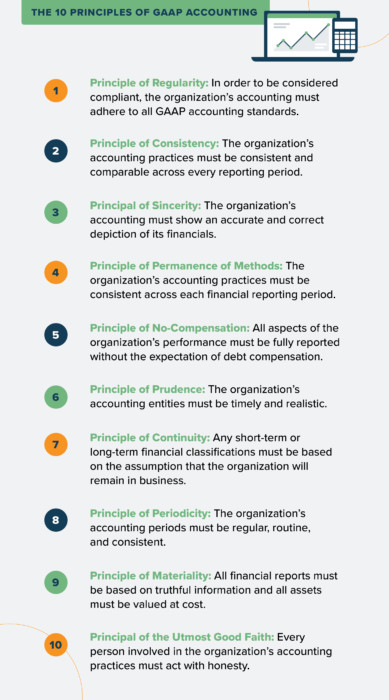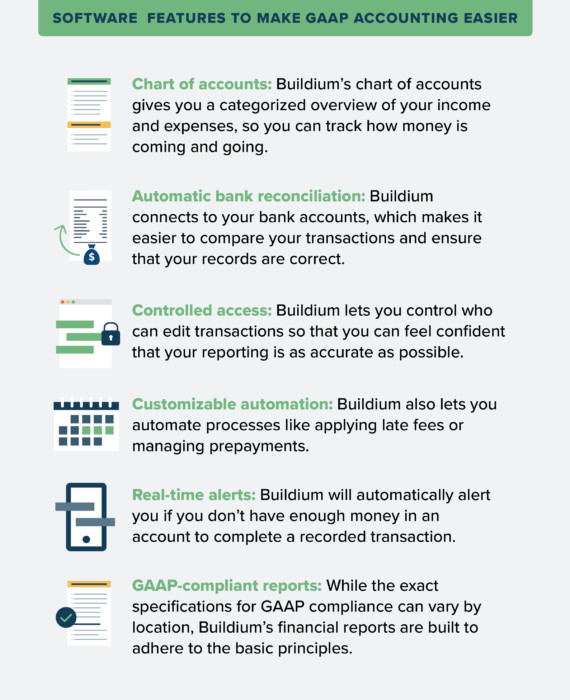While many property managers don’t have accounting backgrounds, managing their organization’s financial reporting is still on nearly every PM’s to-do list. If you have been tasked with handling accounting tasks for your property management company, it’s a good idea to keep GAAP accounting principles in mind. Here’s an overview of GAAP accounting and how it can help you run your business with more accountability and transparency.
What is GAAP accounting?
The phrase “Generally Accepted Accounting Principles (GAAP)” refers to a set of rules that are commonly used in financial reporting. These accounting standards follow ten distinct principles that are issued by the Financial Accounting Standards Board (FASB), an independent nonprofit organization responsible for setting accounting standards for publicly-traded companies in the United States.
Notably, GAAP accounting standards are slightly different from the International Financial Reporting Standards (IFRS), which are used by many countries around the globe. However, in recent years, the FASB has made efforts to make GAAP principles better match the international standard.
The 10 principles of GAAP accounting
There are ten GAAP accounting principles in total and they are as follows:

The Benefits of Following GAAP Accounting Principles in Property Management
While all publicly-traded companies in the United States are obligated to follow these standards when issuing their reports, private companies are allowed to choose whether or not they want to adhere to them. As a property manager, you will most likely be in a position to make a choice for your organization.
There are many benefits to adhering to these principles, including:
- It helps you plan ahead. Having access to reliable and consistent financial information makes it easier to identify trends and forecast into the future.
- It maintains consistency. Consistent reporting makes record keeping simpler and reduces the risk of fraud.
- It makes it easier to identify areas of improvement. GAAP accounting gives you a realistic picture of your organization’s performance, which can help you to better identify its strengths and weaknesses.
- It builds trust. GAAP accounting gives you the ability to provide your clients with reliable and realistic financial information, which can make it easier for them to trust you to take care of their hard-earned income.
For his part, Michael Morse, a Product Manager with Buildium, strongly recommends that property managers follow GAAP accounting principles whenever possible. After working in the industry for several years, he sees it as a best practice that can help you avoid serious liability in the event of an audit:
“It can be a matter of your reputation or even your livelihood. If you’re ever audited, you need to be able to back up your reporting with financial documentation. If your books are a mess and you can’t do that, you could be fined, you could lose your license, and you could even go to jail. [GAAP accounting] gives you a system for maintaining the documentation you’ll need if you’re ever audited in the future.“
Is There Software to Make GAAP Accounting Easier?
While GAAP accounting does offer some substantial benefits, there’s no denying that it also creates more work. As Morse puts it, “property managers are dealing with so much manual labor on a daily basis and GAAP accounting does add a lot of paperwork. However, automating some of that work can make it easier.”
There is software out there that can do just that, cutting down on the amount of time you spend pouring over spreadsheets. International Financial Reporting Standards, in particular, offers a host of features that can help simplify the GAAP accounting process.
Here’s a closer look at some of the features that can make your accounting tasks more manageable:

As Morse puts it, “Buildium offers property management accounting tools for people who aren’t accountants. A lot of the features that we build into Buildium are set up with GAAP accounting principles in mind. We do the heavy lifting so that you can just set it and forget it.”
The Bottom Line on GAAP Accounting
At the end of the day, following GAAP accounting principles is likely to be the best course of action for your property management company. It not only helps you streamline the financial reporting process and provides you with a realistic picture of your organization’s financial health, but it also helps you to build trust with your clients, which is key to business growth.
However, you don’t have to shoulder the added administrative burden of adhering to GAAP accounting practices alone. Buildium can help you generate reports that are GAAP-compliant and automate many of the processes that go into keeping your organization’s records up to date.
If you’re curious to see how Buildium can help you streamline your financial reporting, give our free trial a spin today.
Read more on Accounting Accuracy
